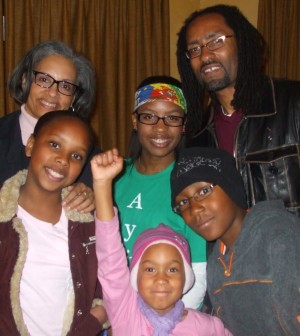Ndiyabulela President Mbeki!
Dearest Gentlemen,
It is with a joyful heart that we send you this letter to express our most sincere thanks for the dignified manner in which, over the past seven years, both of you have offered to our native Haiti a solid, comforting and restful brotherly shoulder. This, you have done in your capacity as President of the Republic of South-Africa, during a much difficult season of our national life. Mèsi anpil! Ndiyabulela! Ngiyabonga! (kakhulu)!
As the year 2003 drew to an end, Haiti’s fragile democracy was attacked relentlessly by powerful international forces. The latter allied themselves with criminal elements of Haitian society with the goal of toppling the democratically-elected government, led by President Jean-Bertrand Aristide. Hundreds of miles across the Atlantic Ocean, South-Africa rose to make its mighty presence felt by the side of a besieged sister nation. If your prompt and heroic intervention did not avert the February 29, 2004 Coup d’État, it nonetheless helped affirm, for our generation, important principles and practices of international solidarity and genuine brotherhood that our beloved pan-africanist ancestors Anténor Firmi n, Marcus Garvey and Robert Sobukwe would have wholeheartedly applauded and encouraged.
n, Marcus Garvey and Robert Sobukwe would have wholeheartedly applauded and encouraged.
It was with awe and great pride that we watched the friendly flag of South-Africa wave gracefully over the ship docked at Port-au-Prince harbor, on that windy December day of 2003.
President Thabo Mbeki, you had decided to disregard the hateful diatribes of the fearmongers. Boldly, with honor and respect, you came and celebrated with us, in Haiti, the 200th anniversary of our national independence which also marks a most crushing defeat suffered by state-sponsored and church-blessed racial slavery in the Americas.
Ayiti-Azania: A Common Struggle Against Absolute Evil
Ayiti, as the native Tainos people called her, is known as Africa’s first-born daughter in the Americas. She shares with Azania some characteristics which compel us to remain hopeful about the fate of humanity. A beacon of freedom during the era of the MAAFA, like Azania in our generation, Haiti was reborn from and for the struggle of good over absolute evil.
Starting with the 1444 Portuguese attacks against the coast of Africa and the Papal bull of 1452, absolute evil took the insidious form of racial slavery whereby millions of human beings were systematically kidnapped, uprooted, terrorized, thrown to sharks in the middle of the Atlantic Ocean, enslaved and worked to death on countless plantations all over the Americas. While some who claimed to be the most enlightened of our species were merely paying lip service to the ideals of liberty, equality and human brotherhood, the wretched of the earth rose and led, by themselves, a genuine revolution against the evil (dis) order of the day. Indeed, the giant step Boukman, Cecile Fatiman, Toussaint L’ouverture, Jean-Jacques Dessalines and their comrades helped accomplish during those faithful years of revolution (1791-1803) represents a truly irreversible victory for humankind.
I Was Homeless and You Provided Me Shelter
Mindful that numerous Africans were still suffering in bondage in the Americas, barely days after the 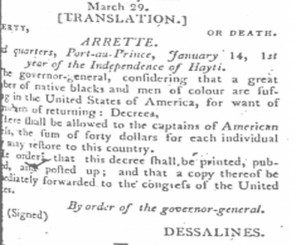 creation of the Republic of Haiti, founding father Jean-Jacques Dessalines published a decree, dated January 14, 1804, in which he announced devoting part of the new nation’s meager post-war budget to securing the emancipation of formerly enslaved human beings.
creation of the Republic of Haiti, founding father Jean-Jacques Dessalines published a decree, dated January 14, 1804, in which he announced devoting part of the new nation’s meager post-war budget to securing the emancipation of formerly enslaved human beings.
It is thus self-evident why, in 2004, revolutionary South-Africa celebrated the bicentennial of the Haitian Revolution, while others had decided that such celebration must be boycotted and sullied with a bloody coup d’état.
President Zuma, a year ago, during your visit to England you expressed gratitude toward those who had helped shelter you along with other leaders of the ANC, during those difficult years of exile. Speaking of the deep conviction held by elder Sisulu, yourself and the other comrades, you said you knew that ultimately “the power of the people was too powerful for a government to say you can’t stay here”. Indeed, even beneath the dusty rubbles of present day Haiti, the gracious spirit of Dessalines lives on. We find it extremely uplifting that Robert Mangaliso Sobukwe’s global pan-africanist spirit is also very much alive in the new South-Africa. We experienced its warm presence, in July 2010, as a tour guide at your Union Building in Tshwane was blooming with pride recounting the dignified reception the Presidency of his country had reserved to the deposed leader of Haiti, as he set foot on Azanian soil with his wife and two small daughters. The great risks and sacrifices that the Republic of South-Africa and its leaders have voluntarily shouldered for the benefit of their Haitian brothers and sisters are sincerely appreciated. We take this opportunity to congratulate and encourage you also for the bold and productive efforts you have recently multiplied to help our brothers and sisters in Côte d’Ivoire attain a peaceful and sustainable resolution of the conflict which is affecting their beautiful country. Your able leadership is duly noticed and appreciated!
Smili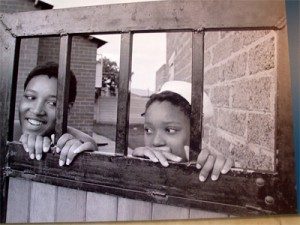 ng through the gate – The above picture of an enlarged 1960s photograph was taken on July 14, 2010 at the family house of Elders Rolihlahla Mandela and Winnie Madikizela in Soweto. As we admired these innocent smiles (courtesy of the beautiful daughters of Madiba), we could not help but make the parallel with young Michaelle and Marie-Christine Aristide who, although offered the blessed opportunity to be with their parents, in a nice physical surrounding, are made to live as “free prisoners” because of the international violence which threatens the lives of their too politically active, too black and too socially-conscious parents.
ng through the gate – The above picture of an enlarged 1960s photograph was taken on July 14, 2010 at the family house of Elders Rolihlahla Mandela and Winnie Madikizela in Soweto. As we admired these innocent smiles (courtesy of the beautiful daughters of Madiba), we could not help but make the parallel with young Michaelle and Marie-Christine Aristide who, although offered the blessed opportunity to be with their parents, in a nice physical surrounding, are made to live as “free prisoners” because of the international violence which threatens the lives of their too politically active, too black and too socially-conscious parents.
Honouring an Old and Noble Tradition
Today, President Aristide and his family prepare to leave Azania to return to Ayiti, where this couple of experienced scholars vow to contribute positively to a much-needed revival of their country’s education system. The sincere thanks we address to you President Zuma and to you President Mbeki, are not due to the shared African ancestry which binds us genetically nor is it, merely, for the common experience that our two nations share in over 500 years of struggle against white supremacist violence. Rather, we do so in keeping with an age-old Haitian tradition of paying due gratitude and homage to those who, regardless of race, creed or color, have stood firm and constant in the revolutionary fight against injustice and barbarism, any and everywhere.
Back in the 1800s, while so-called “white liberals” in the Americas and Europe were paying lip service to the cause of human brotherhood and universal freedom, with “la société des amis des Noirs” agitating for an extra day of rest for the millions of enslaved Africans, there stood in the United States of North-America, a beautiful human soul named John Brown who, contrarily to the self-styled “liberals”, had refused to advocate for “slavery light”. Rather, Brown took up arms, joined his African brothers and demanded that racial slavery – the absolute evil – be immediately and forever eradicated from the face of earth. As you know, the Haitian Revolution inspired several armed rebellions in the slave states of the U.S. Gabriel Prosser (1800), Denmark Vesey (1822) and Nat Turner (1831), led rebellions involving thousands of enslaved Africans.
When, in October 1859, the U.S. Government crushed John Brown’s attempt to seize the arsenal and armory at Harpers Ferry, Haiti shared the pain of millions. History records that, following Brown’s 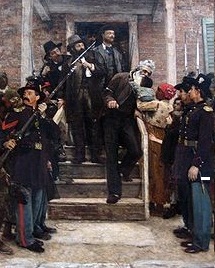 December 2, 1859 hanging, Haiti went to great lengths to express her gratitude to this sincere revolutionary leader who was willing to shed away white privilege and commit race and class suicide for the benefit of humanity. During three days of national mourning for John Brown’s execution, flags in Port-au-Prince were flown at half mast. A solemn mass was held in the cathedral, with the active participation of President Fabre Nicholas Geffard. It is also then that the main boulevard of Port-au-Prince was named Avenue John Brown.
December 2, 1859 hanging, Haiti went to great lengths to express her gratitude to this sincere revolutionary leader who was willing to shed away white privilege and commit race and class suicide for the benefit of humanity. During three days of national mourning for John Brown’s execution, flags in Port-au-Prince were flown at half mast. A solemn mass was held in the cathedral, with the active participation of President Fabre Nicholas Geffard. It is also then that the main boulevard of Port-au-Prince was named Avenue John Brown.
The Revue de Commerce which declared “the death of John Brown to be a crime against humanity” wrote “while waiting the happy day of the regeneration of our enslaved brethren, let us raise in our hearts our altar to John Brown, the immortal benefactor of our race, the holy victim of our cause, and let us adopt, as our sister and friend, his worthy and unfortunate widow”. Indeed, all over the island, collections were made and subscriptions started in behalf of the widow of John Brown. They collected twenty thousand dollars for Brown’s family.
Thus, spoke and acted the grateful sons and daughters of Jean-Jacques Dessalines, in 1859.
“Lè ou wè vye zo nan chimen, konnen li te gen chè sou li yon jou” – when you see old bone by the road, be mindful that it had once carried flesh and muscles says the Haitian proverb.
iNingizimu Afrika lizwe elimangalisayo!
Its glorious past notwithstanding, today, Haiti is known for the endemic poverty which deprives the majority of her people of the opportunity to lead normal, happy and productive lives. It is a disturbing fact that abject poverty has reached in Haiti depths that are simply unacceptable in our modern age. Like racial slavery and apartheid, abject poverty is an absolute evil whose eradication shall require of us bold and decisive acts of international brotherhood and genuine solidarity.
Poverty is unfortunately, a current and global phenomenon. We have seen how you are valiantly struggling against it in South-Africa. We have been to the impoverished communities near Johannesburg and Cape Town. Dreadful as we found these realities which you are still facing, we came away, nonetheless, with the overall assessment that South-Africa is today a place of tremendous hope and rising aspirations. More so than the good quality of your national road network or the impressive infrastructure of your major cities and of your institutions of higher learning, the beautiful images and sounds that remain with us from our July 2010 experience are those of these bright, multilingual, young men and women whom we met in Durban (at the University of Kwazulu Natal), in Johannesburg and in Cape Town; the professional radio journalists we heard commentating the World Cup games; the citizens calling in to express their well-articulated opinions on the thorny issue of illegal immigration, the multiracial volunteer health-care workers we interviewed as they were providing AIDS prevention education in Cape Town etc… Indeed, you are a proud and determined people engaged on a historical path to greatness. Yes, iNingizimu Afrika lizwe elimangalisayo! South-Africa is a beautiful country, inhabited by a beautiful, courageous, generous and friendly people.
Surely, the seven years our beloved former president spent among you represent a two-way educational experience of immense value for both peoples.
Today, after years of knowledge-sharing among their South-African brethren, Dr. Jean-Bertrand Aristide and Mrs. Mildred T. Aristide are heading home. To no small extent, gentlemen, this great achievement will come to pass because of your efforts.
You have demonstrated exemplary vision and courage by welcoming Haiti’s exiled former President in 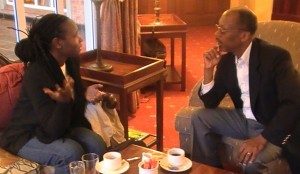 your country where, based on all accounts, he and his family have been treated with due respect and brotherly care. Now, as you work out important details of protocol and security with the Government of Haiti, we feel obligated to bring to your attention the disturbing presence on Haitian soil of notorious convicted criminals who took an active part in the murderous 2004 coup d’état. These men walk the streets of Haiti without a care in the world, seemingly benefiting the support of powerful international forces. Many have already raised their voices to demand that the Government of Haiti deploy every effort necessary to guarantee the safe accommodation of Haiti’s former President and his family, in full accordance with the requirements of the Haitian Constitution.
your country where, based on all accounts, he and his family have been treated with due respect and brotherly care. Now, as you work out important details of protocol and security with the Government of Haiti, we feel obligated to bring to your attention the disturbing presence on Haitian soil of notorious convicted criminals who took an active part in the murderous 2004 coup d’état. These men walk the streets of Haiti without a care in the world, seemingly benefiting the support of powerful international forces. Many have already raised their voices to demand that the Government of Haiti deploy every effort necessary to guarantee the safe accommodation of Haiti’s former President and his family, in full accordance with the requirements of the Haitian Constitution.
Beware the Prophets of Doom!
No doubt, as you receive this letter, you would have also been made aware of a strange collection of modern-day missionaries who are busy spewing out prophesies of gloom and doom in certain North-American and European publications that are known to be hostile to president Aristide’s return home. The hateful messages of these naysayers is nothing new or out-of-character. They know all too well why “this return” represents a major blow to the face of white supremacist racism and a serious defeat of global banditry. Indeed, in December 1859, while the multitude mourned the passing of a great human being, there were strange folks who met the killing of John Brown with celebration. Back then, the famous European writer, Victor Hugo wrote a thoughtful letter of condolences and sympathy, addressed specifically to the People of Hayti, in which he stated: “ I have been sadly deceived in that fraternity of races, the Southern States of the American Union. In killing Brown, they have committed a crime which will take its place among the calamities of history”. Thankfully, from 1859 to 2011, remarkable progress has been accomplished on our little planet to create this genuine fraternity of races that Hugo dreamed about. Although said fraternity is dealing with growing pains, we may, for instance, proudly celebrate that Victor Hugo’s visionary attitude can find its match in that of contemporary European writer Claude Ribbe, in the writings of Professor Michel Chossudovsky or those of Danny Glover, Naomy Klein, Noam Chomsky, Randall Robinson or those of the beloved and unforgettable John Maxwell, who still speaks so powerfully from the other side of life, in sharp denunciation of the bicentennial coup d’état and continued exile of Haiti’s democratically-elected President.
Let us Put Sciences and Technology to the Service of Humanity
In closing, Brothers Zuma and Mbeki, allow us to say that, much beyond its formidable power of symbolism, we dare dream that President Aristide’s return shall also signal the dawn of a new era of enhanced cooperation between Haiti and South-Africa. Many are we who long to see full diplomatic relations established between our two nations, with an active and vibrant Haitian Embassy in Tshwane (Pretoria) and a dynamic South-African High Commission in Port-au-Prince. South-Africa today can proudly boast of hosting 8 of the 10 highest ranked universities of the African continent, with the University of Cape Town, the University of Pretoria and Stellenbosh toping the list. It is crucial that these two revolutionary countries engage in fruitful, mutually beneficial cooperation; especially, in the fields of applied Sciences and Technology. Brother Presidents, I am sure you both agree, the African Renaissance must know absolutely no borders, be they man-made or otherwise!
Indeed, depi nan Ginen bon Nèg ap ede Nèg! Brotherhood is as ancient as motherland Africa.
Ayibobo! Amandla!
Jafrikayiti (Jean Saint-Vil) and Darlène Lozis, Ottawa, Canada.
N.B. : We take this opportunity to salute the tireless Mother of the Nation, Winnie Madikizela, and we send our best wishes of happiness and prompt recovery to our beloved Madiba.



